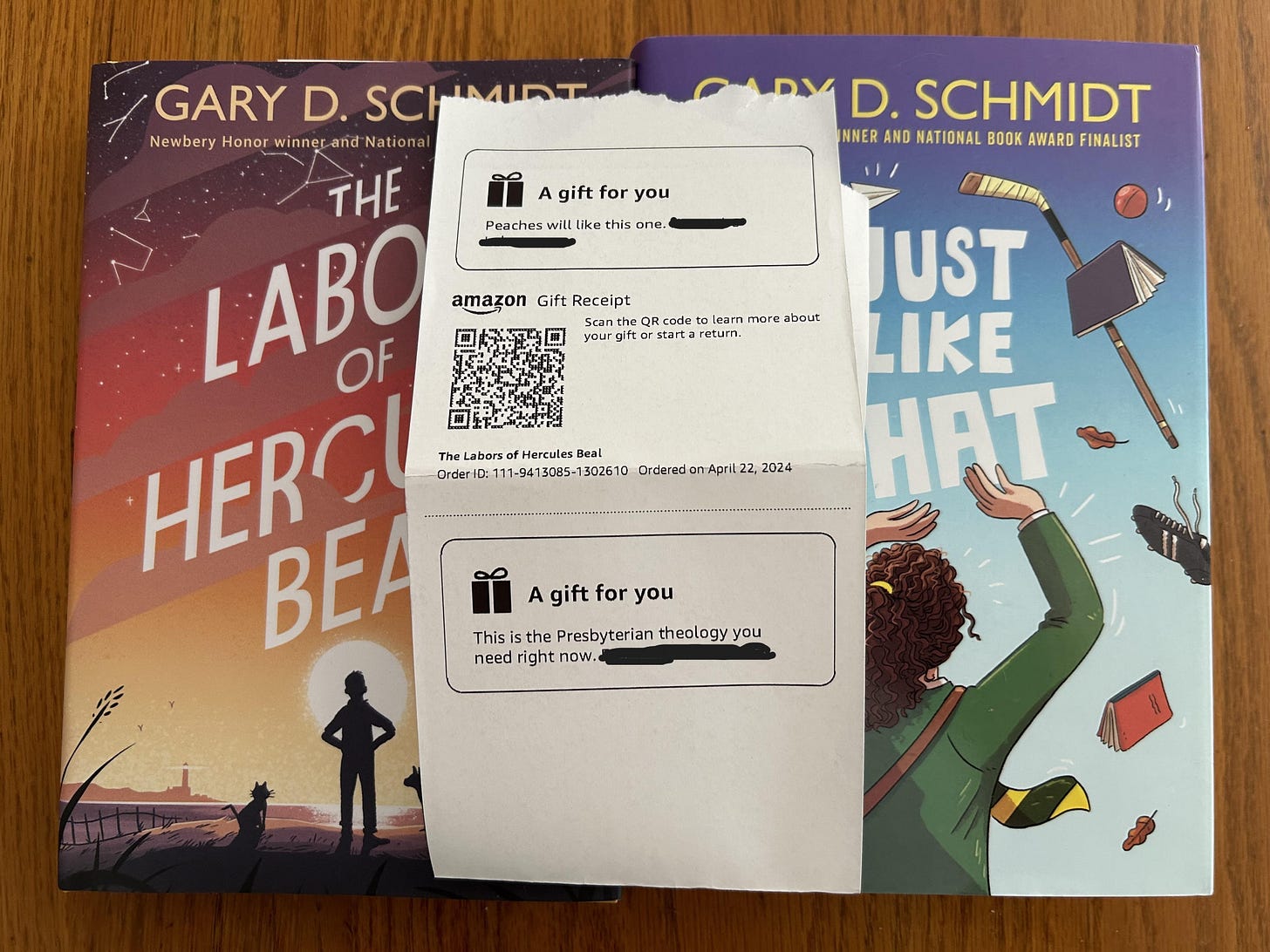Held by the Hand of Providence
Plus: Peaches' review of The Labors of Hercules Beal; also, the return of Fresh Linkage
Dear Friends,
We heard from multiple readers in response to Megan’s guest post last month. Though I’m always a little jealous of the way she connects with so many of you, it does my heart good when she receives the kind of feedback that matches her writing: honest and heartfelt. Here are just a few excerpts from reader emails, the first from a peer from our seminary days:
“Thanks so much, Megan, for your post. It is an encouragement to me—my heart and soul. The last 10 years have been pretty difficult for me/us and I appreciate your testimony to what the Lord is teaching/has taught you…I am sort of pre-grieving [our last two kids’] flights as adults. I appreciate you sharing that part, as well as the overall lessons.”
Here’s an excerpt from an email from an older woman in the faith:
“I loved your guest post on too many levels to mention. I could identify with so much of it…We underestimate all those changes going on—the good-byes, the moves, the deaths. The stress points just add up. And we wonder why we are depressed…duh! Just wanted to let you know it was a very encouraging, hopeful post.”
And this from a woman who was one of Megan’s high school campers at Eagle Lake in Colorado in the late ‘90s, and then a parent at our school in Oklahoma City in the early ‘10s:
“I love reading your family updates and encouragement about what God is teaching you in the ups and downs of life. Keep on keeping on! I came to know Christ at Eagle Lake as Megan’s camper and will forever be thankful for your ministry there so many years ago.”
Last Sunday, Megan spoke at a women’s luncheon at Exodus Church on a few of the themes in the post and all week I’ve heard from others how well-received her words were. While her 2nd graders aren’t as easily impressed, Megan has three weeks—15 days!—left before finishing her first year at Springfield Christian. She’s done well by her students and their families, and I marvel at her patience and perseverance in teaching and training this generation.

Learning & Serving
For me, most of April was focused on preparing for and taking three ordination exams in addition to my normal duties overseeing Sunday morning operations. The past two Sundays, I prepped and helped lead music for our worship service, and three Sundays back, I preached on Matthew 7:36-50, which includes Jesus’ parable of the two debtors. I’ve embedded the video below (pro tip: if you play it at 1.5x, it will only take 30 minutes to get through…ahem).
Over the past several months, we’ve seen several new folks come around, which has been exciting, and are hosting a two-part overview for those seeking to become members.
The month of May also kicks off a season of travel, as I’m scheduled to preach nine times at five different churches over the next three months. Megan and I also hope to squeeze trips in to see the girls, my first one being a mid-May road trip with Millie to Bozeman with a quick 12-hour visit with Bruce, Maddie, and Emily (Megan and I hope to both visit a week in July). We also have some extended family graduation parties and a wedding at the end of the month.

May
14: Craig officially comes under care of the Presbytery of Northern Illinois
15-18: Craig road trips with Millie to Bozeman, MT, where she’ll nanny/work the summer at Black Boar Truffle; visit with Bruce, Maddie, and Emily before flying back to Illinois
19: Craig preaches at Forreston Grove Church (Forreston, IL)
24: Megan’s last day of the school year at Springfield Christian School
26: Craig preaches at Exodus Church (Springfield, IL)
27-29: Megan’s nephew Titus Ray’s wedding (Springfield, MO)
If you happen to travel through the Midwest and need a place to stop or stay for a night, let us know. We may not be here, but we’ll give you the door code and leave the light on for ya!
Thanks as always for reading Second Drafts,
Craig (for Megan)
Held by the Hand of Providence
Despite hours of study and the prayers of many, on Monday, April 22, I failed pretty miserably my oral examination on Reformed theology and the Book of Church Order, as conducted by the Presbytery of Northern Illinois Credentials Committee in Peoria.
Even a few weeks after the fact, it’s hard to write that. I don’t fail well. In the past 10 years, I’ve gotten better (and faster) at it, but even with practice, it doesn’t get easier.
Though I was approved to be considered as an intern and come under care of the presbytery (which I will do at our quarterly meeting on May 14), I will not preach for licensure this month as previously planned and will need to be re-examined by the committee before the September presbytery meeting to be considered for that. As a result, the earliest I might be ordained as a pastor is a year from now. As in 2025.
Becoming a teaching elder (pastor) in the Presbyterian Church in America is a high bar to get over; the process is purposeful, and the breadth and depth of material to learn and inculcate is immense. And yet, as much as I hate to say it, the committee made the right decision in not approving me this time, a fact I told them when they communicated their verdict at the end of my two-and-a-half hour oral examination.
Though the day was awful, it had nothing to do with the six men on the committee; they were warm and kind and generous. So what happened? Basically, my preparation was inadequate and I did not perform well (at all) in trying to compensate. For those interested in the insider baseball, the mistake I made was preparing for the exams (both written and oral) without better verbatim language and comprehension of the Westminster Confession of Faith and catechisms. As a result, I ended up trying to cobble together theological and systematic answers on the fly, but I didn’t cobble well enough: my answers were poor, shallow, and unclear. In a word, it was embarrassing.
Feelings of Fraud & Frustration
That afternoon, on the heels of the examination (as well as the 2-3 days following), the feelings of fraud were overwhelming. I remember these feelings and paying heed to them 19 years earlier in seminary, choosing to go the Christian education route rather than the pastoral one. I wrote in my journal on the cusp of my first summer intensive class (Beginning Greek, of all things) in June 2005:
“I have two main fears: the first is believing my own press and overestimating my academic faculties that I’m really cut out for this. I so long to learn and grow, to write and teach, but I do wonder sometimes if I just have hermeneutic or homiletic limits (among others) I will never be able to exceed.
The second fear is, if it is indeed all wrong, I will not have the courage to acknowledge what I thought might be a good fit isn’t, but try to gut it out for the sake of pride or convenience and feel totally defeated and discouraged as a result.”
Having to justify one’s vocational existence in the world has been one of the most frustrating experiences of my life (a good friend summed it up well, emailing recently, “I know that y’all have lots of frustrations professionally in your lives”). Here I was (again) in the depths of those frustrations, and I couldn’t help but wonder if, with regard to pastoral ministry, this was God saying, “Craig, for the last time, no.”
I was sad and disappointed in myself. I wasn’t in any danger of doing something stupid (if I threw myself off my front porch, a broken ankle would probably have been the worst that would have happened, which would have just been inconvenient), but I wasn’t ready to talk about it, either. I felt I had let a lot of people down—the committee, the leadership of Exodus and our Presbytery, Megan and our girls, our financial supporters. Rehashing in real time was the last thing I wanted to do.
The only person I wanted to talk to and hear from was God and what (if anything, I wondered) he wanted from me. At the moment, however, He wasn’t saying much.
Following the Counsel of Friends
Thankfully, Megan (who was ever-encouraging), along with a few others, were:
A friend in Montana gifted me via Amazon a couple of young adult (age 8-12) fiction books by author Gary D. Schmidt, a professor at Calvin University, with a note that said, “This is the Presbyterian theology you need right now.” Though familiar with Schmidt because of Megan’s love for his writing (not to mention that we had just driven to St. Louis to hear him speak in person in March), I didn’t know what to make of the gift or note (though I was glad for the sentiment).
Several friends (who are also PCA pastors) called, texted, or emailed, with one sharing, “Read your post about presbytery. Sorry. It’s rough. I had to retake my ordination orals and one guy said, ‘Well, you passed the character test. You didn’t pass and handled it with grace.’ That has always stuck with me.” I thought about my own response the morning of the exam and was glad God gave a similar grace at the time, but I was worried about how long said grace might stick around.
A friend in Washington D.C. emailed to say, “I can only imagine your disappointment and discouragement. For me personally, such times cause me to re-read Hebrews 12.” I was grateful for the offered spiritual direction, but I didn’t feel very spiritual in taking it.
Nevertheless (and following the counsel of these friends), I read The Labors of Hercules Beal (see Peaches’ Picks review below). I tried to handle my disappointment with grace in my journaling and in conversations about what happened. And I read (and re-read, and then re-read some more) and prayed through Hebrews 12.
Thankfully, after a few dark and actual rainy days that matched my mood, I sensed God’s presence by way of 12:11-13:
“For the moment all discipline seems painful rather than pleasant, but later it yields the peaceful fruit of righteousness to those who have been trained by it. Therefore lift your drooping hands and strengthen your weak knees, and make straight paths for your feet, so that what is lame may not be put out of joint but rather be healed.”
I wrote in my journal:
“I added verses 12 and 13 onto the card of Hebrews 12:11, which was the first verse I ever memorized, as they read like a neon sign this afternoon. I needed not only the hope they offered, but to feel that God might still speak from His Word to me about my situation. I definitely had that sense in this passage these past few days.
Keep me together, Lord. Heal my heart. Help me embrace anew with lifted hands the task, strengthen my prayer life, and help me chart the next course, and keep me from being lame and out of joint in all the ways I am and can be. Motivate me and renew my discipline so that peaceful, righteous fruit might come.”
By the end of the week, I had communicated with those I needed to that I was going to get back on the horse and, after studying across this summer (in the midst of everything else going on), that I hoped to take another run up Oral Examination Hill.
A Puritan Perspective on Providence
But God wasn’t done speaking (He kind of does this with me: holds off until I’m eventually out of words and quiet enough to finally shut up and listen—a la Elijah in 1 Kings 19—then lays it on thick to make sure I get the point).

Earlier this week, I attended a weekly study in which several older Exodus members and attenders have been studying Puritan pastor Jeremiah Burroughs’ book, The Rare Jewel of Christian Contentment. As with many of the Puritans, providence—the doctrine of how “God the great Creator of all things doth uphold, direct, dispose, and govern all creatures, actions, and things, from the greatest even to the least” (that’s from the Westminster Standards—see, I’m making application already!)—is kind of a big deal. Well, in chapter three, section nine, Burroughs writes on page 84,
“To understand the scope of God’s providence, one must be well-versed in the art of contentment.”
Very true, we agreed, but is the reverse even more true? We thought it was; that is,
“To understand the art of contentment, one must understand the scope of God’s providence.”
Normally not in the habit of editing 17th century Puritans, I confess our variation hit home harder. And Burroughs seemed okay with it, writing a few paragraphs later:
“To understand in a spiritual way that God’s hand is in every single thing that happens to us, from morning to night, every day—this is from God and it can be a great help to contentment.”
He then elaborates on the power and effectiveness of God’s providence in section two, pages 84-85:
“The power of providence is undeniable. No matter how frustrated or angry we may be, we cannot change the course of providence…So I would say to anyone feeling discontent and impatient: why do you think God’s providence should change its course for you? Do you think it’s so weak that it has to change just because you’re not happy? Whether or not you are content, God’s providence will continue to move forward its own power and strength. Can you really make a single hair black or white with all the fuss you’re making? When you are on a ship at sea with all its sails spread and a strong wind pushing it forward, can you make it stop by running around the deck? No more can you make God’s providence alter its course with your worrying and fretting; it will continue with power, no matter what you do. Just understand the power and effectiveness of providence and it will be a great help in teaching you the lesson of contentment.”
Burroughs then introduces a compelling illustration of his point in section three:
“…There are an infinite number of cogs in the works of providence; if you look at all the works God has done from eternity past to eternity future, they all make up one single work, and they have been like cogs that have been turning in a precise and orderly way to achieve the end that God has planned since eternity.
We tend to look at things in isolation, focusing on one detail without understanding how it relates to the rest. But God sees the whole picture, understanding the relationship between each part. For example, when a child looks at a clock, they may look at one wheel and then another, not seeing the connection between them. But the clockmaker has an eye on all the wheels, understanding how each one depends on the other. In the same way, God sees the interconnectedness of all things in his providence.”
As good as all that is, the final two paragraphs resonate most with me. He writes:
“Now consider how this contributes to contentment: when something happens to me as part of God’s plan, that’s like one cog in a clock. If that cog stops, it could stop a thousand other things that depend on it. In a clock, if you stop one wheel, you stop them all because they are all connected. So when God has determined something to be a certain way in the present, how can you know how many other things depend on it? God may have something planned twenty years from now that relies on what happens to me today or this week…
…So in the grand scheme of things: if this one event doesn’t go my way, it’s as if a thousand other things didn’t go my way. I should be at peace and accept it, because even though I’m disappointed in this one thing, God’s plan is still being achieved in other ways. I should remember that this is part of his plan, and I can’t possibly know what he’s trying to accomplish or how many other things depend on this event.”
Message received, Jeremiah Burroughs.
Message received, please, Lord.
Considering (or Reconsidering) God’s Providence
The point in sharing all this is ultimately not about my failure or success (though as the joke goes, “Enough about me? What do you think about me?”). On the contrary, I felt compelled to illustrate what God continues to remind me of concerning His providence and my own wrestling with it. Maybe it will speak to you in a needful way.
Make no mistake: there are certainly far bigger and more significant things—in your life and even in mine—to care about than my path to ordination. For instance:
Some feel like the world is coming apart at the seams: tornadoes and floods, the war in Palestine (and the protests fueled by it on college campuses), Russia and Ukraine, Haiti, our own southern border—pick your global conflict.
Some suffer from a physical or mental ailment…or if you don’t, you know someone—a parent, a spouse, a sibling, a child, a friend—who does.
Some struggle to make ends meet and wonder how you (and your kids and grandkids) will ever afford living in the most prosperous country in the world.
Some are in wounded relationships, the emotional burden of which you physically feel because there seems little hope of resolution or restoration.
Some wonder if God is aware of or cares about you and your life, and if it would really be any different or worse if He just didn’t exist at all.
I have news for you: it would be totally worse; the worst, actually, since Colossians 1:17 reminds us that Christ “…is before all things, and in him all things hold together.” In other words, there’s no need to go there when, without God in Christ, there would be no “there” to go to!
Perhaps like me, your faith may indeed feel lame and in need of healing, but now is not the time to put it out of joint. Perhaps a consideration (or reconsideration) of God’s providence is in order—especially when life doesn’t seem to make sense. As this helpful TableTalk post encourages and reminds, we can call on God’s providence…
“…when God’s ways are ‘past finding out’ (Romans 11:33, KJV). When tragedy strikes. When joy surprises. When sorrow overwhelms. When opportunity knocks. When circumstances push us to the edge. When we have no answers.”
What, after all, is the alternative? That God is making this all up as He goes along? That He doesn’t really know what He’s doing and is just hoping we haven’t caught on yet? That He really doesn’t have a plan or a purpose and is content to just let the world play out as it will? That doesn’t sound much like the Creator God Who reigns “by his most wise and holy providence, according to his infallible foreknowledge, and the free and immutable counsel of his own will, to the praise of the glory of his wisdom, power, justice, goodness, and mercy.” (WCF 5.1)
May the scope of His providence foster in us the art of contentment in our lives. As Paul reminds us in Romans 11:36, God will be glorified in everything He does, “For from Him and through Him and to Him are all things. To Him be glory forever. Amen.”
Peaches’ Pick: The Labors of Hercules Beal
Hercules Beal is a 7th grader who, along with his early twenty-something brother, Achilles, lives in Truro, Massachusetts, just off Cape Cod, where they keep the Beal Brothers Farm and Nursery going in the absence of their parents, both of whom were killed in a car accident a year-and-a-half ago. Hercules’ best friends are his dog, Mindy, and one-eyed feline, Pirate Cat, and though he has suspicions about Achilles’ girlfriend, Viola, being a vampire, he gets along well enough with her and (most of) the neighbors and students at the Cape Cod Academy for Environmental Sciences.
One of Herc’s teachers is a retired marine lieutenant colonel who teaches humanities (of all things) and assigns each student a unique year-long “Classical Mythology Application Project,” the goal of which is for students “to learn something about yourselves through studying the classical myths which,” Lieutenant Colonel Hupfer explains, “are stories meant to convey something about the world and about your place in it.” (p. 39-40). Hercules, then, is assigned the performance of and reflection upon each of the twelve Labors of his famous namesake and their relevance to his life.
The rest of the book, then, is a master class in literary structure and storytelling by author Gary D. Schmidt, who weaves a redemptive tapestry from the events and lessons of the live(s) of Hercules (past and present) on friendship, family, community, and healing. Here is a favorite dialogue between teacher and student from page 284:
“Lieutenant Colonel Hupfer stood, walked over to the cabinet with his medals, chose one, took it out, weighted it in his hand. Then he carried it over and stood next to me.
‘You know, Beal, you’ve been fighting a whole lot of monsters this year, monsters much more real than any the mythical Hercules fought. And you’ve been fighting stuff that’s come at you out of the blue. And none of it is fair, and none of it is right, and none of it is anything you’ve deserved. That’s the world, Beal.
But you haven’t crumbled, have you? And you haven’t disappeared. You’re still here. And the truth is, no matter what happened with your parents, and no matter what happens with Elly [his girlfriend who moved from Massachusetts to Ohio], you’re still going to be here.’
He handed me the medal.
‘What’s this for?’
‘For still being here.’”
Never let books written for younger audiences scare you. As C.S. Lewis once observed,
“A children’s story which is enjoyed only by children is a bad children’s story. The good ones last.”
Schmidt’s story—like the strength of his book’s namesake—indeed lasts. Read this one on your own or with your kids, regardless of how young or old they (or you) are.
Fresh Linkage
We’re bringing back our “Fresh Linkage” feature from Second Drafts’ earlier days. Here are some Peaches-suggested articles without commentary for your consideration:
“The Revolution Has Begun in the UK” (After Babel)
“Is ‘Identity in Christ’ Even in the Bible?” (Anthony Bradley)
“Finding the Boundaries of the American Midwest” (Project Muse)
“The Biggest Story” (The Biggest Story)
“The Hidden Powers of Everyday Ritual” (The MIT Press Reader)
Until next time…
Craig and Megan Dunham live in Springfield, IL, where Craig serves as Ministry Coordinator at Exodus Church and is pursuing ordination in the Presbyterian Church in America, while Megan teaches 2nd grade at Springfield Christian School. Part of their income comes from donor support, so please consider joining their financial team (all gifts are tax-deductible).
Know someone interested in the Dunhams’ ministry in Springfield? Share this newsletter!
Want to contact the Dunhams? Email either or both: Craig and Megan.









